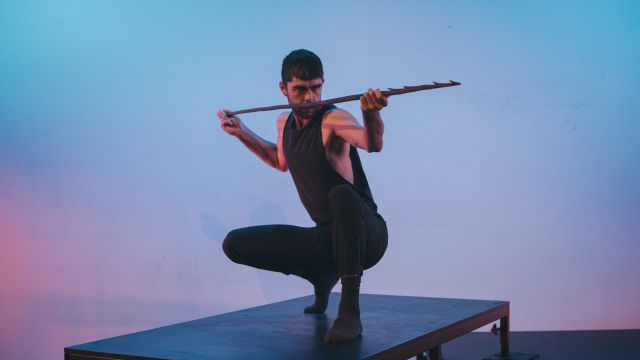Soul of Possum
A colonial military expedition moves inexorably upriver. Marnuu (Jyden Brailey) has learned of this deadly incursion from his dreams of Possum (her voice is that of Tahlee Fereday). He tries to warn Gundi (Balaneba) and Barru (playwright Brodie Murray), but they mock him and don’t believe him. They don’t hear Possum and they are young and cocky. Marnuu is from a different tribe, a trespasser, not initiated in the same ways as they were.
Downstream, the military expedition’s steamboat is moored by a bank of the river. Captain Cooper Gibbons (Leigh Scully) is in command – and his mission is ambiguous – but ominous. We know what lies in store for uncooperative natives. His men are fractious, and he struggles to assert his authority. Lieutenant Lachlan Bankes (Gabriel Partington) is insubordinate and sexually frustrated; he plans to kidnap native women upriver. Meanwhile, he has his eye on Irish convict Willard Yates (Luke Mason), whom he nevertheless persecutes. All this is seen, if not understood, by Dr Anthony Wilkins (Kevin Dee), an official observer and naïve upholder of 18th century values…
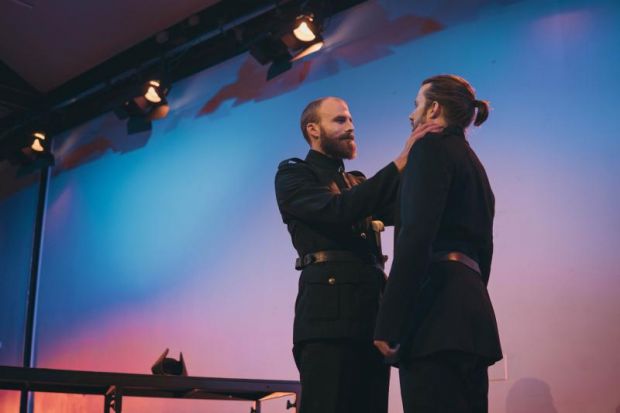
Thus, the set-up of this historical thriller, a mix of fact and fiction, based on the real experiences of Wamba Wamba man Brodie Murray’s ancestors. In his program note, the playwright acknowledges all the people – besides his family - and organisations that have helped and nurtured him and developed his play: Karin Farrell and the First People’s Young Artists Program at the Melbourne Theatre Company, the Aboriginal Performance course at WAAPA, and, principally and crucially, his dramaturg and mentor, Arrerente man Declan Furber Gillick.
Whatever the specific contributions of these influences and collaborators – who include director Beng Oh and producer Ballardong Noongar woman Erica McCalman – the result is a gripping narrative that not only generates a rising tension but is also rich in ideas. There is the unabashed depiction of indigenous customs and beliefs – but also the internecine conflicts that weaken resistance to the invader. Among the whitefellas, there are the frictions of class and racism, supressed sexuality, the rising violence and panic of these white men in a totally alien environment, and the intellectual who is impotent and ineffectual in the face of the colonial agenda. I was reminded of Conrad’s An Outpost of Empire, and there are echoes of Melville’s Billy Budd in the characters of Yates and Lieutenant Bankes.
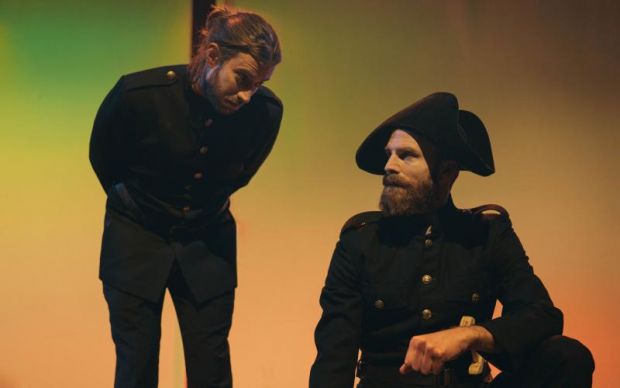
Other theatre makers could learn from this stripped back but powerful production. First, the Meat Market Stables long, shallow playing space is lateral - with the audience all on one side. Rather than this being a hindrance, director Beng Oh makes full use of the whole space – often signalling the contrast between the fluidity and ease of movement of the native warriors on one hand, and the blocked confinement of the whites. The whites’ weapons are deliberately stylised. There is no set – all the action, which switches from the bush upriver, to the decks of the steamboat and the riverbank, is played out in this ‘empty’ space and on two simple central platforms. And yet, aided by Shane Grant’s lighting and Ben Keene’s sound design, we are never for a moment lost and wondering where we are.
The actors’ body language communicates so much too. The warriors are loose limbed yet proud and aggressive, swift, and almost balletic. Is this the influence of Wakka Wakka Gangulu man Balaneba’s dance skills and spirit? Tharawal and Yorta Yorta man Jyden Brailey is so graceful that it’s a pleasure just to see him move.
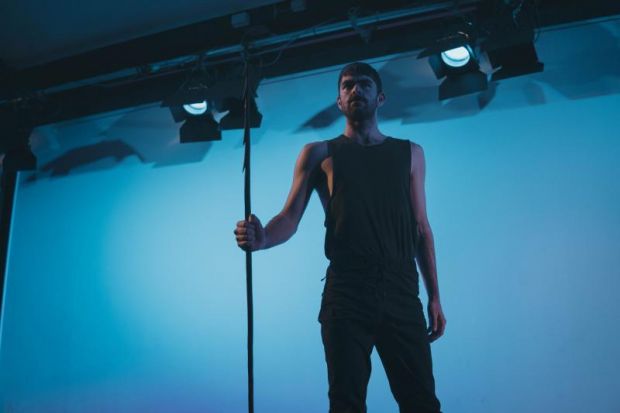
The whitefellas, by contrast, are either rigid, stiff-necked, and antsy, or, in the case of Irish convict Yates, cowering and ingratiating. Leigh Scully’s Captain Gibbons is a man aware of his fragile authority and hiding it with Bluster. Gabriel Partington has enormous presence and gives Bankes a concentrated malice and violence that is threatening and riveting. Nicely juxtaposed by Kevin Dee’s Dr Wilkins who glides about, as if above it all (at first), smiling absurdly, his dark glasses signalling his limited vision.
The show is not without flaws. There are perhaps some repetitions in the text, in which conflicts are unnecessarily restated. If I have any reservations about the cast, there might be rather too much shouting as a substitute for emotion and there are some diction problems no doubt due to inexperience with spoken performance.
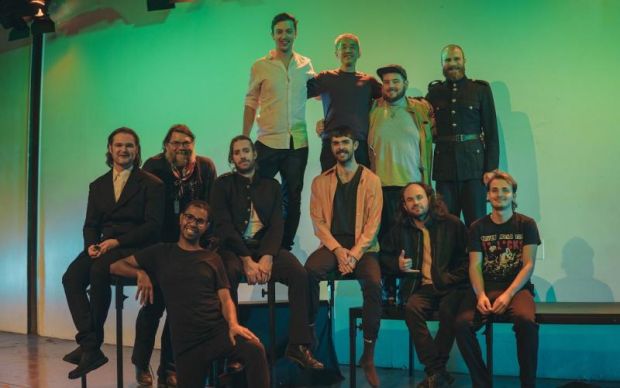
Such issues are minor in the sweep of the play. Soul of Possum has those essential narrative qualities of irony, drive and it keeps the audience constantly asking, ‘What happens next?’ The play is a huge achievement for Brodie Murray, Declan Furber Gillick, their collaborators and the YIRRAMBOI and Castlemaine Festivals. Murray himself is, I think I was told, twenty-three. What will he do next? What he has done here is tell an indigenous story that no one can fail to understand and have it brilliantly realised by the cast, Beng Oh, producer McCalman and company.
Michael Brindley
Photographer: Cameron Grant
Subscribe to our E-Newsletter, buy our latest print edition or find a Performing Arts book at Book Nook.

